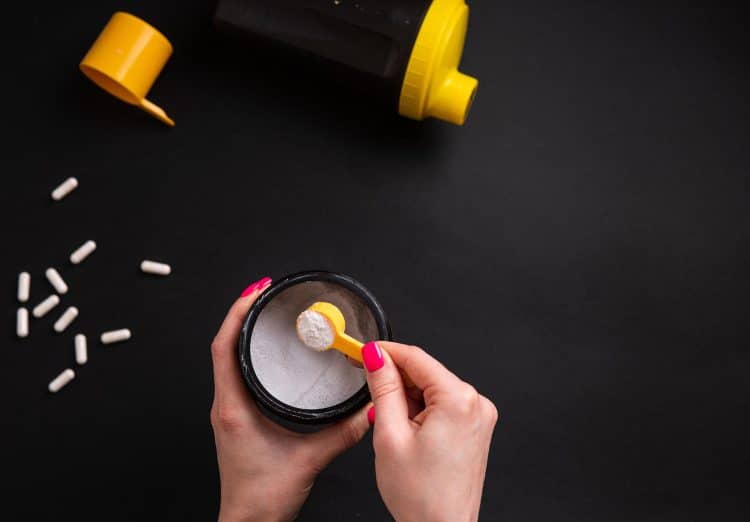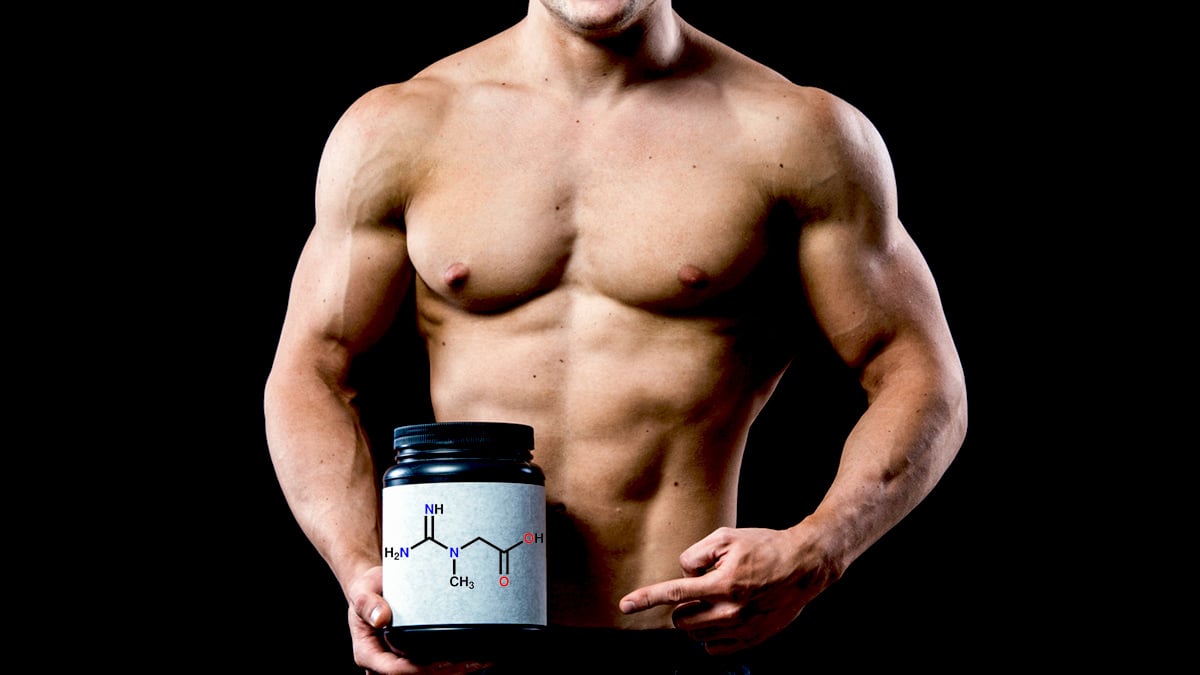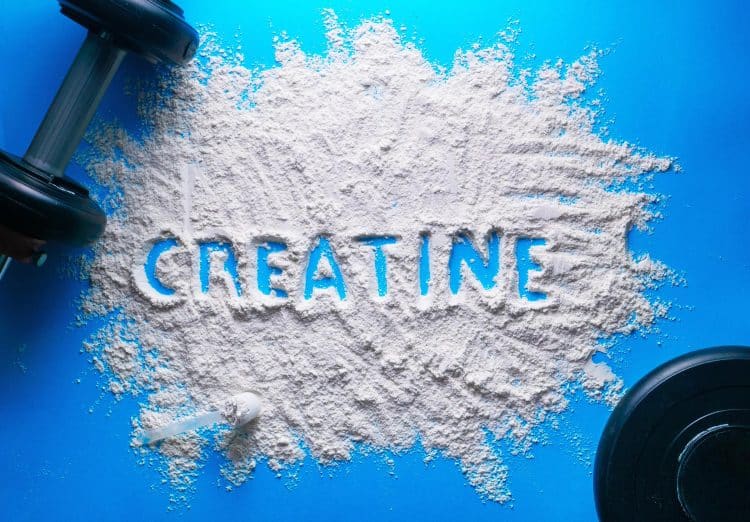Creatine is a widely acclaimed sports nutrition supplement, particularly popular among bodybuilders. Known as an ergogenic—performance-enhancing—supplement, creatine is naturally produced in the liver and can also be ingested through dietary sources.
Creatine boosts energy production during short bursts of high-intensity exercise, such as weightlifting or sprinting.
Studies show that creatine enhances muscle mass, strength, and exercise performance. Despite its benefits, some criticize creatine for alleged side effects. However, no empirical evidence supports these claims. [1]
Before examining creatine’s association with body weight, let’s discuss its nature, composition, and effects.
Understanding Creatine
Creatine, an organic compound naturally present in muscle cells, consists of arginine amino acids and glycine. Found in meat, fish, and poultry, creatine has gained popularity as a supplement among athletes and bodybuilders engaged in physically intensive sports.
Similar to amino acids, creatine supplements comprise essential compounds that aid protein synthesis in your body. While 95 percent of the body’s creatine is stored in muscles, five percent resides in the brain.
In skeletal muscles, creatine is stored as creatine phosphate. This substance binds to ADP (adenosine diphosphate) to form adenosine triphosphate (ATP), the primary energy source for your body and brain [2].
Creatine Composition
Creatine comprises three core amino acids: arginine, glycine, and methionine. For those concerned about calorie intake from creatine supplementation, it’s crucial to note that most creatine supplements on the market deliver zero calories per serving.
How Does Creatine Work in Your Body?
Creatine maintains a continuous energy supply to your muscles during exercise. It’s also essential for brain, heart, and other tissue functions. Despite natural production, it’s possible to have low creatine reserves in your muscles.
When supplementing with creatine, it binds with a phosphate molecule to form phosphocreatine, providing instant energy for high-intensity performances. Proper creatine supplementation can increase ATP availability, offering extra strength, energy, and endurance.
Note: Creatine does not show instant results. It takes time to saturate your muscles, a process known as creatine saturation. Only then does the compound begin to exert its performance-enhancing effects.
Can Creatine Make You Fat?
There’s much debate about whether creatine contributes to body fat accumulation. Importantly, creatine itself doesn’t contain calories and won’t make you fat unless you’re in a calorie surplus—consuming more calories than you expend daily.
Athletes aiming to build muscle mass and strength often require more calories. When the body undergoes rigorous training, it burns excess calories as fuel rather than storing them as fat.
Some studies indicate that creatine causes water retention inside muscles, leading to swelling. Lean and muscular individuals may experience water retention in their muscles during the initial creatine intake phase. Therefore, weight gain associated with creatine supplementation may be primarily due to water retention [3].
If your body fat levels range from normal to high, the water retention from creatine intake may not be visibly apparent in your muscles. This is because the muscles are already covered by fat. For those aiming to build bigger, stronger, and fuller muscles, creatine can be a valuable supplement when combined with proper training.
Can Creatine Make You Gain Weight?
Creatine can contribute to muscle mass gain, but it’s not a magic solution. You need to put in the hard work at the gym to see results. It’s not as simple as consuming creatine and waiting for muscles to develop.
To maximize creatine’s benefits, consistent training is crucial. Creatine transforms into ATP in the body, essential for energy generation. The ATP is rapidly catalyzed in muscles, aiding in recovery after intense training sessions.
This energy boost can enhance gym performance, potentially leading to increased muscle mass gains over time.
Some individuals may experience initial bloating with creatine consumption, especially during the loading phase. However, this effect typically balances out as the body reaches creatine saturation.
[Related: Weight Gain Calculator]
Creatine Loading and Its Effect on Body Weight
During the creatine loading phase, athletes typically consume 20 to 25 grams of creatine daily to achieve muscle saturation quickly. This is followed by a maintenance phase, involving 3-5 grams of creatine daily.
The loading phase may cause some water weight gain, but this fluid retention often subsides as lean muscle mass increases.
Creatine Dosage

Whether aiming for conscious weight gain or not, it’s crucial to adhere to recommended creatine dosages. Those consuming an omnivorous diet—containing 1-2 grams of creatine from meat and fish—can achieve creatine saturation by consuming 5 grams of creatine four times daily for at least 5-7 days.
Maintenance involves ingesting 3-5 grams of creatine daily. However, athletes and weightlifters seeking strength and muscle gains should consume 5-10 grams daily. Our creatine dosage calculator can help determine your daily creatine requirements.
Studies show creatine can help build lean muscle mass, potentially aiding weight gain without increasing body fat. Additionally, it may promote faster recovery from injuries [4]. Creatine is a proven supplement for muscle growth, effective for most body types. Furthermore, both men and women can benefit from creatine supplementation.
Safety Considerations
While creatine is generally considered safe, not all supplements on the market maintain the same standards [5].
Long-term creatine use may have side effects, though typically not severe. Potential side effects of creatine overdosing include weight gain, breathing difficulty, anxiety, fatigue, headache, fever, nausea, vomiting, and stomach upset. If you experience such issues, consider reducing your dosage.
Creatine is not recommended for individuals with diabetes, kidney, or liver disease. Those under 18 and pregnant or nursing women should avoid creatine supplementation. If you’re on medication, consult a healthcare professional before starting creatine supplementation.
Managing Creatine-Related Weight Gain
If you experience temporary weight gain from creatine, consider these strategies:
- Regulate sodium intake: Excessive sodium can cause fluid retention. Increase fresh fruits and vegetables while reducing processed and fast food intake to manage sodium levels and minimize water weight [6].
- Monitor carbohydrate intake: While carbs provide energy, a high-carb diet can contribute to weight gain. Reducing carbohydrate intake may help manage weight, especially when addressing creatine-related gains.
- Choose quality creatine: Opt for high-quality creatine supplements and adhere to recommended daily dosages to minimize side effects.
- Maintain intense training: Regular, intense workouts can help reduce water retention. Consistent exercise will utilize more fluid and increase sweat output, potentially offsetting water retention.
Frequently Asked Questions
Is creatine consumption safe?
When taken in recommended dosages, creatine has no reported adverse health effects. However, consult a medical professional if you have underlying health conditions before starting supplementation.
How should I start creatine supplementation?
While not always necessary, the loading phase is an effective way to begin creatine supplementation. For beginners, maintaining a dosage of 3-5 grams daily is suitable, while high-level athletes may benefit from 5-10 grams daily.
What’s the most popular form of creatine used by athletes?
Creatine monohydrate is the most extensively researched and widely used form of creatine supplement among high-performance athletes.
Can I lose the weight gained from creatine supplementation?
Creatine itself doesn’t cause fat gain or loss. If you’re concerned about weight gained through water retention, this typically subsides when you stop taking the creatine supplement.
Is creatine suitable for women?
Yes, women can safely use creatine, especially to improve exercise capacity, build lean muscle mass, strengthen muscles, and enhance recovery speeds.
Learn more about Creatine:
Conclusion
In summary, scientific evidence does not support claims that creatine directly causes weight gain or obesity. This supplement is not a shortcut to building muscles but can be an effective tool when combined with proper training and nutrition.
Individuals with pre-existing health conditions, particularly liver issues, should consult a physician before starting creatine supplementation. When used correctly, creatine can be a valuable asset in your fitness journey, supporting muscle growth and performance enhancement.
References
Fitness Volt is committed to providing our readers with science-based information. We use only credible and peer-reviewed sources to support the information we share in our articles.
- Guingand, Deborah L. de, et al. “Risk of Adverse Outcomes in Females Taking Oral Creatine Monohydrate: A Systematic Review and Meta-Analysis – PMC.” PubMed Central (PMC), 15 June 2020.
- Creatine: MedlinePlus Supplements.” Creatine: MedlinePlus Supplements, Accessed 9 Sept. 2022.
- Creatine Supplementation Increases Total Body Water Without Altering Fluid Distribution – PubMed.” PubMed, 1 Mar. 2003.
- Cooper, Robert, et al. “Creatine Supplementation with Specific View to Exercise/Sports Performance: An Update – PMC.” PubMed Central (PMC), 20 July 2012,
- Wax, Benjamin, et al. “Creatine for Exercise and Sports Performance, with Recovery Considerations for Healthy Populations – PMC.” PubMed Central (PMC), 2 June 2021,
- “Creatine Monohydrate Gras Notification” – https://www.fda.gov/media/143525/download
- Rakova, Natalia, et al. “Increased Salt Consumption Induces Body Water Conservation and Decreases Fluid Intake – PMC.” PubMed Central (PMC), 17 Apr. 2017.












